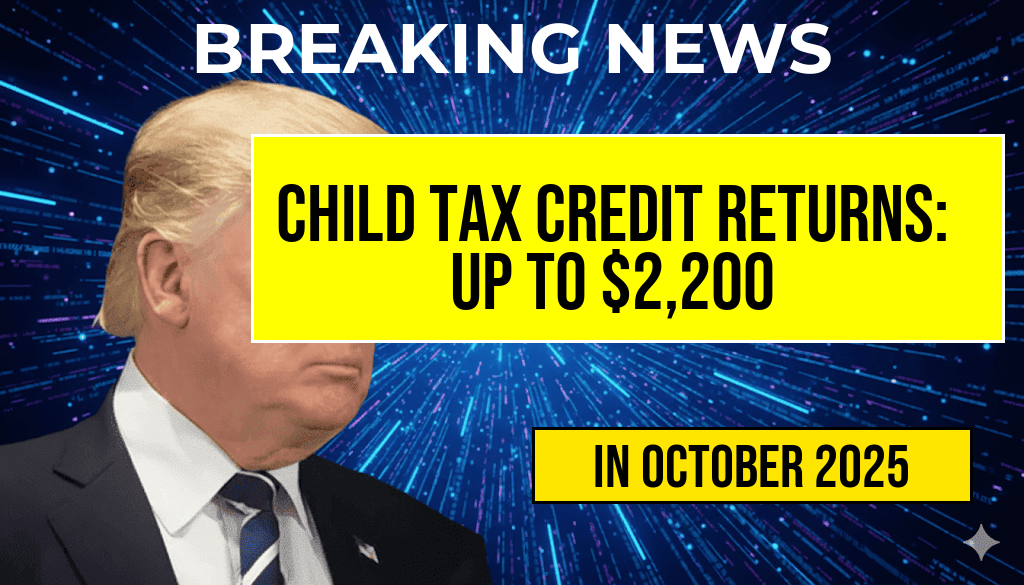Starting next year, millions of American families will have access to increased Child Tax Credit benefits, allowing them to receive up to $2,200 per qualifying child. This enhancement aims to provide significant financial relief amid ongoing economic challenges and to support the well-being of children across the country. The expanded credit, part of recent legislative adjustments, is designed to reduce child poverty, bolster household budgets, and promote economic stability. Families eligible for the Child Tax Credit can expect to see the increased payments reflected in their tax filings and, in some cases, through advance monthly payments. As the new tax year approaches, understanding the eligibility requirements, payment structure, and how to maximize these benefits becomes essential for millions of households.
Understanding the Updated Child Tax Credit Structure
The Child Tax Credit has undergone several modifications over recent years, with the latest adjustments making the benefit more accessible and generous for qualifying families. For the 2024 tax year, eligible taxpayers can claim up to $2,200 per qualifying child under age 6, and up to $2,000 for children aged 6 through 17. These figures represent an increase from previous years, reflecting efforts to provide targeted assistance to families with children.
Eligibility Criteria
- Income Limits: The credit phases out gradually for families with modified adjusted gross incomes (MAGI) over $75,000 for individuals and $150,000 for married couples filing jointly.
- Qualifying Children: Children must be under 18 at the end of the tax year, be a U.S. citizen or resident alien, and have a valid Social Security number.
- Filing Status: The credit is available to taxpayers who file as single, married filing jointly, head of household, or qualifying widow(er).
Payment Mechanics and Advance Payments
The IRS will continue to disburse a portion of the Child Tax Credit in monthly payments, starting in July 2024. This approach aims to provide families with predictable income streams to help cover everyday expenses. The remaining amount can be claimed when filing the annual tax return. Families can check their eligibility and update their information through the IRS portal to ensure they receive the correct amount.
Impact on Families and Broader Economy
The increased Child Tax Credit is expected to benefit approximately 39 million children across the nation, according to the U.S. Census Bureau. Advocates highlight that such financial support can reduce child poverty rates, improve educational outcomes, and foster better health among children from low- and middle-income households.
| Year | Maximum Credit per Child | Age Range | Additional Benefits |
|---|---|---|---|
| 2023 | $1,600 (under age 6), $1,000 (ages 6-17) | Under 18 | Partial advance payments |
| 2024 | $2,200 (under age 6), $2,000 (ages 6-17) | Under 18 | Expanded eligibility, increased advance payments |
How Families Can Prepare for the New Benefits
Families should review their current tax information and ensure that their details with the IRS are accurate. Updating income figures, Social Security numbers, and dependent information can prevent delays or errors in benefit disbursement. Taxpayers can also consult the IRS Child Tax Credit page for detailed guidance and resources.
Key Steps to Maximize Benefits
- Verify eligibility early and update any changes in income or dependents.
- Opt into advance monthly payments if not already enrolled.
- Consult a tax professional for personalized advice or to explore additional credits.
The reintroduction of larger Child Tax Credit payments underscores ongoing efforts to support American families and address economic disparities. As the new tax year approaches, understanding these changes can help families plan their finances more effectively and ensure they receive all benefits they qualify for. For more information, families should visit the official IRS resources or consult reputable financial advisory services.
Frequently Asked Questions
What is the maximum Child Tax Credit amount families can receive next year?
Families can receive up to $2,200 per qualifying child through the Child Tax Credit next year.
Who qualifies as a qualifying child for the Child Tax Credit?
A qualifying child typically must be a dependent under the age of 17, a U.S. citizen or resident, and meet other criteria such as relationship and residency requirements.
How does the Child Tax Credit impact my tax refund?
The Child Tax Credit can directly reduce your tax liability or increase your refund amount, providing significant financial support for families with children.
Are there income limits to qualify for the Child Tax Credit?
Yes, the income limits determine the eligibility and the amount of the credit, with phase-outs starting at certain income thresholds.
When can I expect to receive the Child Tax Credit payments next year?
Eligible families can expect to receive the Child Tax Credit payments as part of their tax refund or through advance payments, depending on the filing process and IRS schedules.








